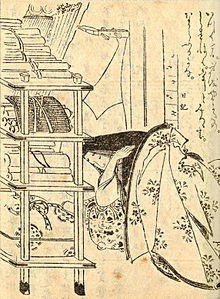
Monogatari (Japanese: 物語, [monoɡaꜜtaɾi]) is a literary form in traditional Japanese literature – an extended prose narrative tale comparable to the epic novel. Monogatari is closely tied to aspects of the oral tradition, and almost always relates a fictional or fictionalized story, even when retelling a historical event. Many of the great works of Japanese fiction, such as the Genji Monogatari and the Heike Monogatari, are in the monogatari form.
History
The form was prominent around the 9th to 15th centuries, reaching a peak between the 10th and 11th centuries.[1] Monogatari was the court literature during the Heian era and also persisted in the form of archaic fiction until the sixteenth century.[1] According to the Fūyō Wakashū (1271), at least 198 monogatari existed by the 13th century and that only 24 exist today.[2]
Genres
The genre is sub-divided into multiple categories depending on their contents:
Denki-monogatari
Stories dealing with fantastical events.
- Taketori Monogatari (The Tale of the Bamboo Cutter)
- Utsubo Monogatari (The Tale of the Hollow Tree)
- Hyakumonogatari Kaidankai
Uta-monogatari
Stories drawn from poetry.
- Heichū Monogatari (Tales of Heichū)
- Ise Monogatari (Tales of Ise)
- Yamato Monogatari (Tales of Yamato)
Tsukuri-monogatari
Aristocratic court romances.
- Genji Monogatari (The Tale of Genji)
- Hamamatsu Chūnagon Monogatari
- Ochikubo Monogatari (The Tale of Ochikubo)
- Sagoromo Monogatari
- Torikaebaya Monogatari
- Tsutsumi Chūnagon Monogatari
- Yoru no Nezame (Wakeful Nights)
Rekishi-monogatari
Historical tales that emerged during the late Heian period, flourishing until the medieval age.[3] These narratives were commonly written in kanbun (hybrid form of Chinese) or wabun (Japanese).[3] Two of the most notable of this monogatari included the Eiga Monogatari and Ōkagami, which both narrated the story of Michinaga, the renowned Fujiwara regent.[3]
Gunki-monogatari
Military chronicles and stories about war.
- Gikeiki (The Tale of Yoshitsune)
- Heiji Monogatari (The Tale of Heiji)
- Heike Monogatari (The Tale of the Heike)
- Hōgen Monogatari (The Tale of Hōgen)
- Soga Monogatari (The Tale of the Soga Brothers)
- Taiheiki (Chronicle of Great Peace)
Setsuwa-monogatari
Anecdotal tales.
- Konjaku Monogatarishū (Tales of Times Now Past)
- Uji Shūi Monogatari (A Collection of Tales from Uji)
Giko-monogatari
Pseudo-classical imitations of earlier tales.
- Matsura no Miya Monogatari
- Sumiyoshi Monogatari
Influence
When European and other foreign literature later became known to Japan, the word monogatari began to be used in Japanese titles of foreign works of a similar nature. For example, A Tale of Two Cities is known as Nito Monogatari (二都物語), One Thousand and One Nights as Sen'ichiya Monogatari (千一夜物語) and more recently The Lord of the Rings as Yubiwa Monogatari (指輪物語) and To Kill a Mockingbird as Arabama Monogatari (アラバマ物語).
See also
- Mumyōzōshi, a 13th-century literary critique on monogatari, many of which are no longer extant
- Fūyō Wakashū, a 13th-century collection of poetry from various monogatari sources, many of which are no longer extant
- Konjaku Monogatarishū, a collection of over one thousand Heian period monogatari, of which 28 remain today.
References
- ^ a b Gunilla, Anders (2011). Literary History: Towards a Global Perspective: Volume 1. Berlin: Walter de Gruyter. p. 13. ISBN 9783110189322.
- ^ A Tale of Eleventh-Century Japan: Hamamatsu Chunagon Monogatari. Princeton, NJ: Princeton University Press. 2014-07-14. p. 4. ISBN 9781400856688.
- ^ a b c Perez, Louis G. (2013). Japan at War: An Encyclopedia. Santa Barbara, CA: ABC-CLIO. p. 464. ISBN 9781598847413.
- Frederic, Louis (2002). "Monogatari." Japan Encyclopedia. Cambridge, Massachusetts: Harvard University Press.
- Kubota, Jun (2007). Iwanami Nihon Koten Bungaku Jiten (in Japanese). Iwanami Shoten. ISBN 978-4-00-080310-6.
- Nihon Koten Bungaku Daijiten: Kan'yakuban [A Comprehensive Dictionary of Classical Japanese Literature: Concise Edition]. Tōkyō: Iwanami Shoten. 1986. ISBN 4-00-080067-1.